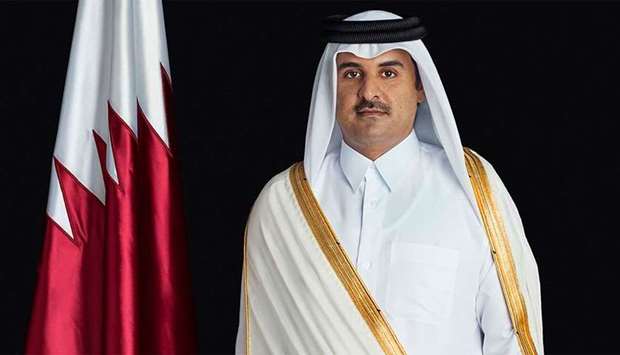His Highness the Amir Sheikh Tamim bin Hamad al-Thani arrived on Thursday in the German city of Munich to take part in the 55th edition of the Munich Security Conference.
The Amir is accompanied by an official delegation.
The conference which starts on Friday is one of the largest and most important international conferences on the global security and defence policies.
Twenty-one heads of state and 75 foreign and defence ministers participated in the last conference.
A strong strategic partnership between Qatar and the MSC emerged during the 18th session of Doha Forum.
In 2011 the first meeting of Munich Security officials was held in Doha, where the two sides agreed to work together more regularly so that the Qatari representation at the conference becomes at the highest level with the participation of the Amir along with other leaders.
Over the course of three days, MSC will be held under the chairmanship Wolfgang Ischinger and with the participation of German Chancellor Angela Merkel, US Vice President Mike Pence and a number of heads of governments and international community organisations.
This year's conference will be held in exceptional circumstances amid many problems, crises and events, which will give the 2019 session great importance.
High on the agenda are themes such as the European Union's self-assertion, transatlantic co-operation, as well as possible consequences of a renewed era of great power competition.
Additionally, experts from across the globe will discuss the future of arms control and co-operation in defence policy.
The intersection between trade and international security will be examined, as will the effects of climate change and technological innovations on the international security.
"When looking at the current state of international affairs, it is difficult to escape the feeling that the world is not just witnessing a series of smaller and bigger crises, but that there is a more fundamental problem," Ischinger said ahead of the conference.
"Indeed, we seem to be experiencing a reshuffling of core pieces of the international order. A new era of great power competition is unfolding between the United States, China, and Russia, accompanied by a certain leadership vacuum in what has become known as the liberal international order," Ischinger said.
Merkel said she intends to work towards preserving international institutions which is as important as it was during the Cold War.
German Foreign Minister Heiko Maas recently called for forming an "alliance of multilateralists"; however, the difficulty of achieving this goal emerges from co-operation with France, Germany's most important partner in Europe.
A survey done by Friedrich Ebert foundation revealed that only 42% of the French, compared to 59% of the Germans support neutral stances from their countries on international issues.
As for military interventions in conflicts, 65% of Germans rejected as opposed to 50% from the French.
This reflects the political process and the different strategic culture between Berlin and Paris.
During the first decades of the conference, attendance was limited and participants were less.
Discussions focused on Western policies within the overall framework of Cold War confrontations.
When the Cold War came to an end, they decided to invite participants from countries that had not been part of the Western world before.
They made room for participants from Central and Eastern European countries, and also from the Russian Federation.
The conference, much like Nato, had to move beyond the confines of one "side" of the Cold War if it was to remain relevant.
Recently, the conference has shifted from focusing on defence issues only to a forum for politicians, diplomats and researchers.
For the fourth time in a row, University of Pennsylvania of the US named the conference as the most important in the world.
Since its inception in the fall of 1963, the MSC has changed in many ways, not just in terms of its name.
It is held annually for three days in Germany, organised by the city of Munich, where hundreds of decision-makers from around the world meet in various security, political and military fields to discuss crises and conflicts on the situations and challenges facing the world at various levels.

